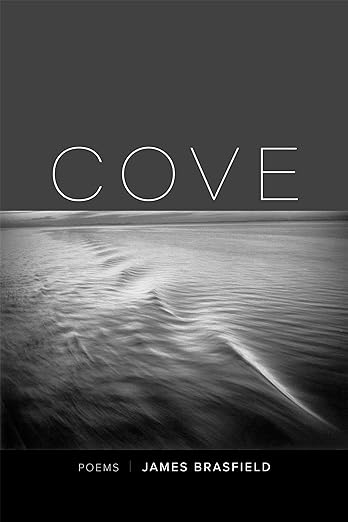Cove
Cove, poems by James Brasfield.
LSU Press, 2023,
66 pages, paper, $17.95,
ISBN: 9780807176603
James Brasfield’s new collection, his third with LSU Press, confirms the eloquence and conviction of his language and the accuracy of his eye. Put another way, the 30 works in Cove: Poems reflect an intensity of observation wedded to lyric delivery.
Take “Late Summer”: in 12 well–wrought couplets, Brasfield takes us from “Now cosmos in bloom and snow–in–summer / opening along the garden’s stone borders” to toasting “a spring in summer, as once each May / a shot of vodka is poured on bare dirt // among gravestones to quench the dead, / among the first stars of this new evening.”
When it appeared on poets.org’s “Poem–a–Day,” Brasfield explained how “Late Summer” moves from “a garden path in the Blue Ridge to a public cemetery and a ritual in Kiev, Ukraine, where, on the first Sunday after Orthodox Easter, families gather to picnic in cemeteries in remembrance of their dead relatives.” You don’t need this background to appreciate the poem, but it certainly enhances the stunning image at the end.
In this and other poems in the collection, Brasfield draws on his long–time connection to Ukraine where he was twice a Senior Fulbright Fellow in the 1990s (The Selected Poems of Oleh Lysheha won him the PEN Award for Translation in 2000). “Tysmenytsia,” which is divided into two parts, “Reprieve” and “Carpathians,” consists of seven connected poems that call up that city in western Ukraine. The poem pays homage to “emblems of endurance,” among them, Lilia Lysheha, Oleh’s widow, recovering from cancer, and a leaf of the zelkova tree holding on. Here’s the final stanza of the second poem, “Winter Precipice”:
How, I wondered, did the leaf
maintain its hold to branch,
or branch its catch of stem, or both,
as someone over a precipice
shares a grip of hands.
Elsewhere in the book Brasfield, who is featured in the anthology Angel’s Wing: Poems Inspired by the Paintings of Piero della Francesca, 2016, continues his dialogue with the Renaissance painter and muralist. More than simple ekphrastic response, his four–part “Piero and the Spider” reflects the composed humanism of the artist. The poem begins with Piero in the act of painting:
Window, piazza, cobbles,
fountain and the ripple unbreaking,
brush in hand unfolding oils, tempera on panel
or pigment to wet walls . . .
And the poem ends with the aged painter remembering “his translations of light, as if / Plato had been // a fisherman sewing his net // for the deep gold and vermillion / spots of a Tiber trout.”
Not long after retiring as Senior Lecturer Emeritus at Penn State in 2017, Brasfield moved to Belfast, Maine, a geographic shift whose impact is most apparent in the title poem, inspired by a visit to Morse Cove on the Penobscot River, near Castine. In 43 five–line stanzas, he leads us non–stop through a landscape of trees and waves, “the new / orientation of where you are,” to places further afield, including Paleolithic caves with “ocher birds ascending upon a wall” and war–torn Syria, “the sounds of velocities / closing in from above / the incoming, incoming, / incoming, incoming . . . ” The currents of Brasfield’s verse are mesmerizing.
Other praiseworthy poems include “Palladium,” which inspired a piece for piano and soprano by composer Edward Jacobs; “The Blue Ceiling” and “Founding Cities,” which involve the poet’s son; “At St. John the Divine, Thinking of Melville,” which harks back to Brasfield’s M.F.A. days at Columbia; “The Erstwhile Forests,” a nifty riff on smoking a pipe; and “Piero: The Resurrection of 1467,” which reminded this reader of Randall Jarrell’s response to Albrecht Dürer’s etching Knight, Death, and the Devil.
In appraising Brasfield’ last collection, Infinite Altars, 2016, author Vivian Gornick noted how his narrative verse “brings to remarkable life the smallest moment, the oldest myth, the acuteness of time.” Those qualities remain in play in Cove. These poems require that you take your time, to savor — and then succumb.
— Carl Little


